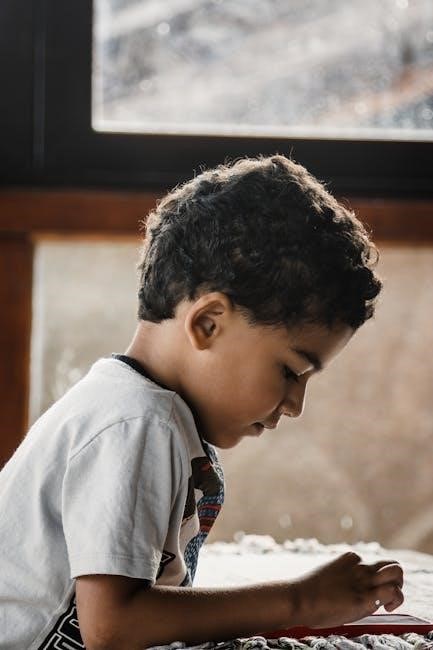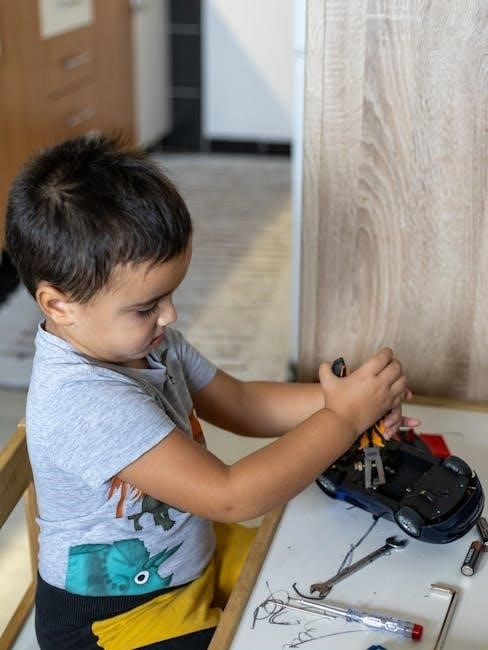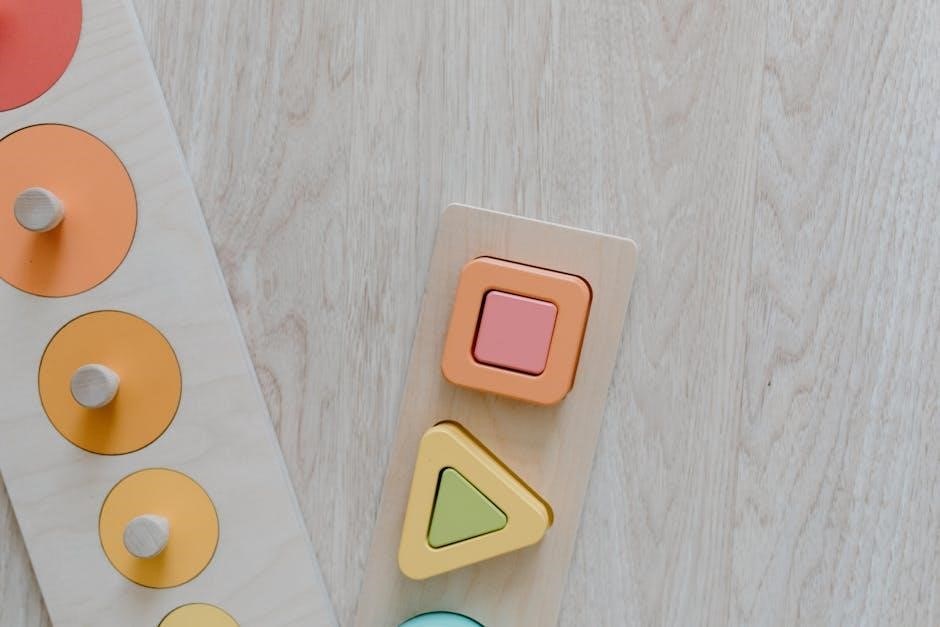The Iowa Early Learning Standards (IELS) are a comprehensive guide outlining developmental expectations for children from birth to age five across eight key developmental areas․
1․1 Overview of IELS and Its Importance
The Iowa Early Learning Standards (IELS) provide a foundational framework for understanding child development from birth to age five․ These standards emphasize developmentally appropriate practices, focusing on eight key developmental areas to ensure children are prepared for school and life․ They serve as a shared resource for educators, families, and caregivers, promoting consistency in early childhood education․ By aligning with best practices and research, the IELS support holistic development, fostering skills in physical, social-emotional, cognitive, and language areas․ This guide is essential for creating nurturing environments that encourage young children to thrive․
1․2 History and Development of IELS
The Iowa Early Learning Standards (IELS) were first developed in 2006 by the Iowa Department of Education to provide a unified framework for early childhood education․ Now in their third edition, the standards incorporate the latest research and best practices in child development․ They aim to ensure all children, from birth to age five, have consistent opportunities to grow and learn․ The IELS are designed to be a shared resource for families, educators, and caregivers, promoting positive interactions and environments․ By aligning with scientific research, these standards help Iowa’s young children thrive and prepare for future success․
Structure of the Iowa Early Learning Standards
The IELS are organized into age-specific guidelines for infants, toddlers, and preschoolers, covering eight key developmental areas to promote holistic growth and readiness for future education․
2․1 Age Groups Covered: Infants, Toddlers, and Preschoolers
The Iowa Early Learning Standards (IELS) are divided into three age groups: infants (birth–12 months), toddlers (1–2 years), and preschoolers (3–5 years)․ Each group outlines developmental milestones and skills, ensuring age-appropriate expectations․ The standards provide a continuum of learning, supporting children’s growth from dependency to independence․ For infants, focus is on sensory exploration and trust-building․ Toddlers emphasize exploration and basic skill development․ Preschoolers concentrate on social interactions, problem-solving, and foundational academic skills․ This structure helps caregivers and educators tailor experiences to meet children’s unique needs at each stage․
2․2 Eight Key Areas of Development
The Iowa Early Learning Standards (IELS) are organized into eight key areas of development, forming a holistic framework for child growth․ These areas include Physical Well-Being and Motor Development, Social-Emotional Development, Cognitive Development, Language and Literacy Skills, Mathematics, Science, Social Studies, and Arts and Creativity․ Each area provides specific benchmarks, ensuring children develop essential skills progressively․ This structure supports caregivers and educators in fostering well-rounded development, preparing children for future academic and life success․ The standards emphasize interconnected growth across all domains․

Key Areas of Development in IELS
The Iowa Early Learning Standards (IELS) outline eight key developmental areas, providing a framework for understanding children’s growth from birth to age five․ Each area is detailed with specific benchmarks․
3․1 Physical Well-Being and Motor Development
The Iowa Early Learning Standards emphasize the importance of physical well-being and motor development in young children․ These standards focus on promoting healthy habits, safety awareness, and the progression of motor skills․ Children are expected to demonstrate an understanding of healthy practices, such as recognizing nutritious foods and following self-care routines like brushing teeth and washing hands․ Motor development benchmarks include refining gross motor skills, like crawling, walking, and running, and enhancing fine motor abilities, such as using hands for tasks like drawing or dressing․ These foundational skills are crucial for overall development and future academic success․
3․2 Social-Emotional Development
Social-emotional development in the Iowa Early Learning Standards focuses on fostering self-awareness, emotional regulation, and positive relationships․ Children are encouraged to express emotions appropriately, demonstrate empathy, and develop cooperation skills․ These standards emphasize the importance of building resilience and self-confidence, enabling children to interact positively with peers and adults․ By nurturing social-emotional growth, the IELS help children develop essential life skills, such as problem-solving and self-awareness, which are critical for long-term personal and academic success․
3․3 Cognitive Development
Cognitive development in the Iowa Early Learning Standards focuses on fostering critical thinking, problem-solving, and memory skills in young children․ The standards encourage children to explore their environment, engage in imaginative play, and develop an understanding of cause-and-effect relationships․ Activities are designed to promote curiosity and logical thinking, preparing children for future academic success․ By aligning with research-based practices, the IELS ensure that cognitive development is nurtured through interactive and engaging experiences, laying a strong foundation for lifelong learning and intellectual growth․
3․4 Language and Literacy Skills
The Iowa Early Learning Standards emphasize the development of language and literacy skills in young children, fostering abilities such as understanding stories, recognizing print, and engaging in conversations․ These standards encourage children to explore books, identify letters, and develop phonological awareness․ Activities are designed to promote a love for reading and writing, preparing children for future academic success․ The standards align with broader educational frameworks, ensuring a smooth transition to formal education while nurturing a strong foundation in communication and literacy․

Benchmarks and Standards for Each Developmental Area
The Iowa Early Learning Standards provide age-specific benchmarks for infants, toddlers, and preschoolers, ensuring consistent growth across physical, social-emotional, cognitive, and literacy domains through research-based guidelines․
4․1 Physical Well-Being Benchmarks
The Iowa Early Learning Standards outline specific physical well-being benchmarks for infants, toddlers, and preschoolers․ These include recognizing healthy foods, following self-care routines like brushing teeth and washing hands, and demonstrating motor skills such as crawling, walking, and using utensils; The standards emphasize safety practices, like identifying hazards, and promote active play to foster physical development․ For preschoolers, benchmarks include using the bathroom independently and showing awareness of personal safety․ These standards aim to ensure children develop foundational physical skills and healthy habits, preparing them for lifelong well-being and success in school and beyond․
4․2 Social-Emotional Benchmarks
The Iowa Early Learning Standards emphasize social-emotional development as a critical foundation for young children․ Benchmarks include demonstrating curiosity, expressing emotions appropriately, and showing interest in exploring the environment․ Children are expected to form healthy relationships with adults and peers, cooperate with others, and engage in group activities․ These standards also focus on emotional regulation, such as calming oneself after distress and showing empathy toward others․ By meeting these benchmarks, children build a strong social-emotional base, essential for future academic and personal success․
4․3 Cognitive Benchmarks
The Iowa Early Learning Standards outline cognitive benchmarks to support children’s intellectual growth․ These benchmarks include problem-solving skills, memory development, and understanding cause-and-effect relationships․ Children are expected to demonstrate an awareness of object permanence, categorize objects, and show an interest in exploring their environment; Cognitive benchmarks also emphasize the development of early math and reasoning skills, such as recognizing patterns and understanding basic number concepts․ These standards help prepare children for more complex thinking and academic readiness in later years․
4․4 Literacy Benchmarks
The Iowa Early Learning Standards include literacy benchmarks to foster foundational language and reading skills in young children․ These benchmarks emphasize understanding stories, recognizing print, and engaging in reading activities․ Children are encouraged to demonstrate an awareness of books, identify letters, and show interest in written language․ The standards also focus on developing vocabulary, comprehension, and early writing skills․ Caregivers and educators are encouraged to create environments that promote a love for reading and prepare children for future academic success․ These benchmarks align with broader educational goals, ensuring children are well-prepared for school and life․

Alignment with Other Educational Frameworks
The Iowa Early Learning Standards align with the Common Core State Standards and Iowa Core Standards, ensuring consistency and continuity in early childhood education and beyond․
5;1 Connection to Common Core Standards
The Iowa Early Learning Standards (IELS) are thoughtfully aligned with the Common Core State Standards, particularly in literacy and mathematics․ This connection ensures a seamless transition for young children as they progress from early childhood education to elementary school․ The standards emphasize foundational skills in areas such as phonological awareness, alphabet knowledge, and numeracy, which are critical for long-term academic success․ By integrating these frameworks, Iowa supports a cohesive educational system that prepares children for future challenges and fosters a strong foundation for lifelong learning․
5․2 Alignment with Iowa Core Standards
The Iowa Early Learning Standards (IELS) are closely aligned with the Iowa Core Standards, ensuring a continuous and cohesive educational experience for children․ This alignment begins in early childhood and extends through K-12 education, promoting consistency in learning objectives․ The IELS emphasize foundational skills in literacy, mathematics, science, and social studies, mirroring the Iowa Core’s focus on critical thinking and problem-solving․ By building on these early standards, the Iowa Core Standards prepare students for long-term academic success and lifelong learning, fostering a strong connection between early childhood education and future academic achievement․
Implementation and Support
The Iowa Early Learning Standards are supported through professional development, family engagement, and community partnerships, ensuring educators and caregivers have the tools to effectively implement the standards․
6․1 Professional Development for Educators
Professional development for educators is crucial for effectively implementing the Iowa Early Learning Standards․ Training programs focus on understanding developmental benchmarks, creating engaging learning environments, and aligning curriculum with IELS․ Workshops and resources help educators integrate best practices, ensuring they are equipped to support children’s growth․ This ongoing support fosters a skilled workforce dedicated to enhancing early learning outcomes across Iowa, ultimately benefiting young children and their future educational journeys․
6․2 Family and Community Engagement
Family and community engagement is vital for fostering young children’s development․ The Iowa Early Learning Standards encourage collaboration between families, educators, and community partners to create supportive environments․ Resources and workshops empower families to actively participate in their child’s learning journey․ Communities play a key role in providing accessible programs and services․ By working together, these partnerships ensure consistent support for children, aligning home and community practices with educational goals․ This collective effort enhances overall development and prepares children for lifelong success․

Impact and Benefits of IELS
The Iowa Early Learning Standards enhance school readiness, foster life readiness skills, and provide a strong foundation for future academic and personal success for young children․
7․1 Improved School Readiness
The Iowa Early Learning Standards (IELS) play a crucial role in enhancing school readiness by providing a foundational framework for young children’s development․ By aligning with key developmental areas, the standards ensure children enter formal education with essential skills in literacy, numeracy, and social-emotional growth․ This preparation fosters confidence and curiosity, enabling smoother transitions into kindergarten and beyond․ The IELS emphasizes developmentally appropriate practices, equipping children with the tools needed to succeed academically and socially․ This strong start sets the stage for lifelong learning and future academic achievements․
7․2 Enhanced Life Readiness Skills
The Iowa Early Learning Standards (IELS) foster the development of life readiness skills, enabling children to navigate challenges with confidence․ These standards emphasize problem-solving, decision-making, and self-awareness, which are critical for lifelong success․ By focusing on social-emotional growth, the IELS help children build resilience and strong relationships․ Additionally, the standards promote healthy habits and self-care routines, laying the foundation for physical and mental well-being․ This holistic approach ensures children are prepared not only for academic success but also for the broader demands of life, fostering independence and a positive outlook․ These skills empower children to thrive in diverse settings and circumstances․
The Iowa Early Learning Standards (IELS) provide a strong foundation for early childhood education, ensuring children are well-prepared for school and life․ By aligning with national frameworks and emphasizing holistic development, the IELS have become a model for early learning․ Moving forward, Iowa aims to enhance these standards, expand access to quality early education, and integrate emerging research and technology․ The future of early learning in Iowa is bright, with a focus on equity, innovation, and continuous improvement to support all children in reaching their full potential․
